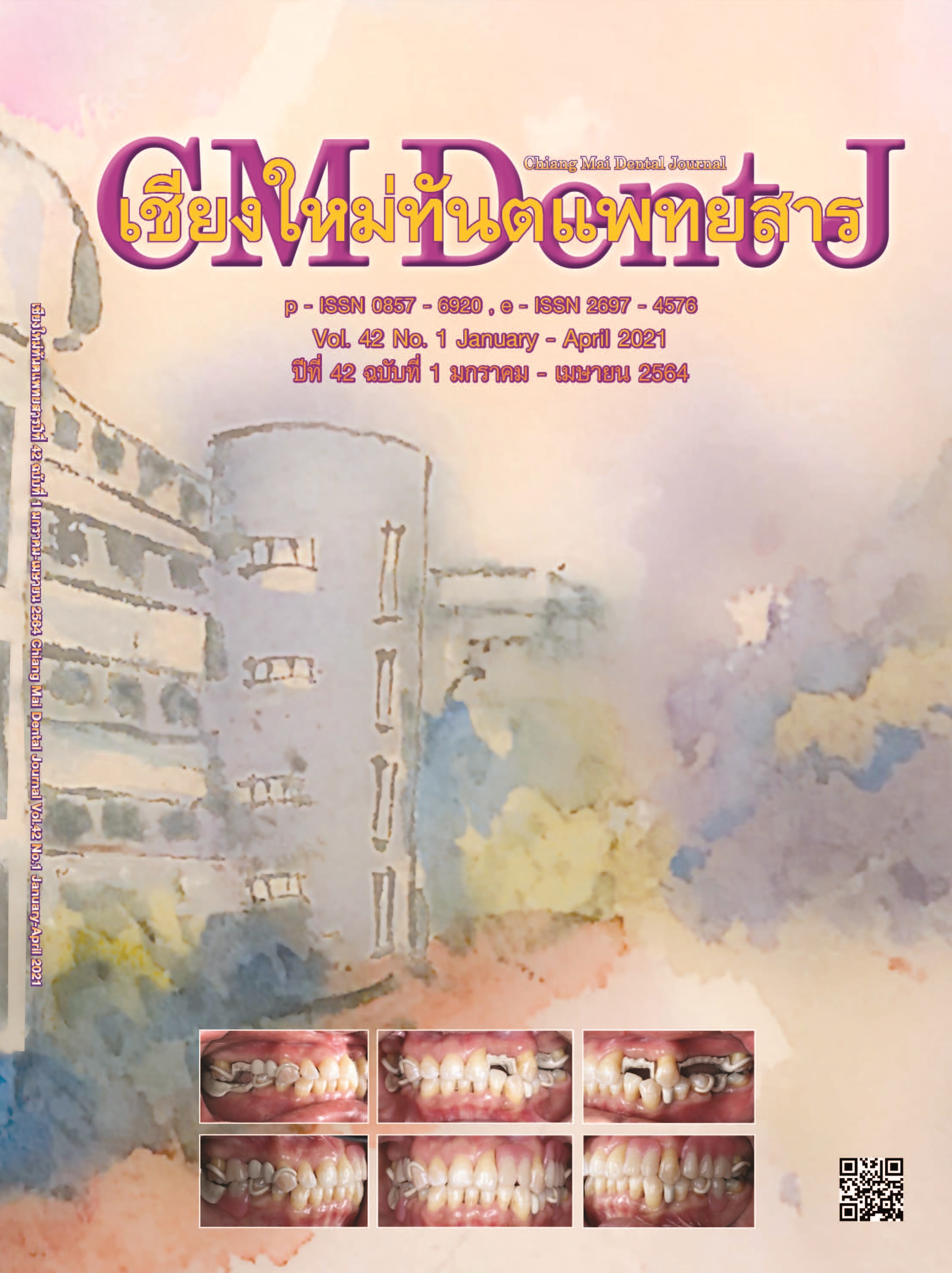Nanohardness and elastic modulus properties of enamel and dentin of primary molars in vitro, in people with various caries experiences, using a nano-indentation technique
Main Article Content
Abstract
Objective: The aim of this study was to investigate the nanohardness and elastic modulus properties of enamel and dentin in extracted human primary teeth in people with various caries experiences, using a nano-indentation technique.
Materials and Methods: Forty-five primary molar teeth were equally divided among three groups, low, moderate, and high caries experience, using the dmft/DMFT index. Non-carious and carious teeth, with intact buccal surfaces, from healthy children aged 4-12 years, were included in this study. Two-millimetre-thick specimens were prepared using two longitudinal sections. Nanohardness and elastic modulus in four zones, outer enamel, inner enamel, outer dentin and inner dentin were obtained using a nano-indentation technique. The mean nanohardness and elastic modulus between groups were analyzed and compared using two-way ANOVA at the p ≤ 0.05 level of significance.
Results: In general, both nanohardness and elastic modulus were significantly different among the four tested zones with greater values in enamel than dentin and outer than inner. Outer enamel and outer dentin in the low caries experience group had significant greater nanohardness (2.88±0.46 GPa, 0.86±0.08 GPa, respectively) than in the high caries experience group (2.37±0.56 GPa, 0.72±0.12 GPa, respectively), whereas only the outer enamel in the low caries experience group had greater elastic modulus (76.46±10.46 GPa) than that of the high caries experience group (61.29±13.33 GPa).
Conclusions: The outer enamel of the low caries experience group had greater mechanical properties than did that in the high caries experience group. This finding raises the possibility that the caries susceptibility of individuals depends on tooth mechanical properties.
Article Details
References
Arends J, Ten Bosch J. Demineralization and remineralization evaluation techniques. J Dent Res 1992; 71: 924-928.
Featherstone J, Ten Cate J, Shariati M, Arends J. Comparison of artificial caries-like lesions by quantitative microradiography and microhardness profiles. Caries Res 1983; 17(5): 385-391.
He B, Huang S, Jing J, Hao Y. Measurement of hydroxyapatite density and Knoop hardness in sound human enamel and a correlational analysis between them. Arch Oral biol 2010; 55(2): 134-141.
Akkus A, Karasik D, Roperto R. Correlation between micro-hardness and mineral content in healthy human enamel. J Clin Exp Dent 2017; 9(4): e569.
Huang TT, He L-H, Darendeliler MA, Swain MV. Correlation of mineral density and elastic modulus of natural enamel white spot lesions using X-ray microtomography and nanoindentation. Acta Biomater 2010; 6(12): 4553-4559.
Davidson C, Hoekstra I, Arends J. Microhardness of sound, decalcified and etched tooth enamel related to the calcium content. Caries Res 1974; 8(2): 135-144.
Scott DB, Wyckoff RW. Typical structures on replicas of apparently intact tooth surfaces. Pub Health Rep 1946; 61: 1397-1400.
Grine F. Enamel thickness of deciduous and permanent molars in modern Homo sapiens. Am J Phys Anthropol 2005; 126(1): 14-31.
Marshall Jr G, Balooch M, Gallagher R, Gansky S, Marshall S. Mechanical properties of the dentinoenamel junction: AFM studies of nanohardness, elastic modulus, and fracture. J Biomed Mater Res 2001; 54(1) :87-95.
Mahoney E, Holt A, Swain M, Kilpatrick N. The hardness and modulus of elasticity of primary molar teeth: an ultra-micro-indentation study. J Dent 2000; 28(8): 589-594.
Lippert F, Parker DM, Jandt KD. Susceptibility of deciduous and permanent enamel to dietary acid‐induced erosion studied with atomic force microscopy nanoindentation. Eur J Oral Sci 2004; 112(1): 61-66.
Joves GJ, Inoue G, Sadr A, Nikaido T, Tagami J. Nanoindentation hardness of intertubular dentin in sound, demineralized and natural caries-affected dentin. J Mech Behav Biomed 2014; 32: 39-45.
Nanci A. Ten Cate's Oral Histology-E-Book: Development, Structure, and Function. 9th ed. St. Louis: Elsevier Health Sciences; 2017: 1-11.
Neel EAA, Aljabo A, Strange A, et al. Demineralization–remineralization dynamics in teeth and bone. Int J Nanomedicine 2016; 11: 4743.
Angker L, Swain MV, Kilpatrick N. Micro-mechanical characterisation of the properties of primary tooth dentine. J Dent 2003; 31(4): 261-267.
Fejerskov O. Concepts of dental caries and their consequences for understanding the disease. Community Dent Oral Epidemiol 1997; 25(1): 5-12.
Featherstone JD. Dental caries: a dynamic disease process. Aust Dent J 2008; 53(3): 286-91.
Anaise JZ. Measurement of dental caries experience‐modification of the DMFT index. Community Dent Oral Epidemiol 1984; 12(1): 43-46.
Thunyarat W, Varisara S, Sitthichai W. Mineral Comparisons of Primary Teeth Among Different Caries Experience Groups in vitro. CM Dent J 2019; 40(3): 135-145.
Gutierrez-Salazar M, Reyes-Gasga J. Enamel hardness and caries susceptibility in human teeth. Rev Latinoam de Metal y Mater 2001; 21(2): 36-40.
Kelly AM, Kaliskova A, Küchler EC, et al. Measuring the Microscopic Structures of Human Dental Enamel Can Predict Caries Experience. J Pers Med 2020; 10(5): 1-17.
Habelitz S, Marshall S, Marshall Jr G, Balooch M. Mechanical properties of human dental enamel on the nanometre scale. Arch Oral Biol 2001; 46(2): 173-183.
Cuy JL, Mann AB, Livi KJ, Teaford MF, Weihs TP. Nanoindentation mapping of the mechanical properties of human molar tooth enamel. Arch Oral Biol 2002; 47(4): 281-291.
Willems G, Celis JP, Lambrechts P, Braem M, Vanherle G. Hardness and Young's modulus determined by nanoindentation technique of filler particles of dental restorative materials compared with human enamel. J Biomed Mater Res A 1993; 27(6): 747-755.
Shellis R, Dibdin G. Enamel microporosity and its functional implications. In: Teaford MF, Meredith Smith M, Ferguson MWJ, ed: Development, function and evolution of teeth, 1st ed. Cambridge: Cambridge University Press; 2007: 242-251.
Poolthong S. Determination of the mechanical properties of enamel dentine and cementum by an ultra micro-indentation system. Doctor of Philosophy (Dentistry). The University of Sydney, 1998.
Craig R, Gehring P, Peyton F. Relation of structure to the microhardness of human dentin. J Dent Res 1959; 38(3): 624-630.
Kinney J, Balooch M, Marshall S, Marshall Jr G, Weihs T. Hardness and Young's modulus of human peritubular and intertubular dentine. Arch Oral Biol 1996; 41(1): 9-13.
Pashley DH. Dentin: a dynamic substrate--a review. Scanning Microsc 1989; 3(1): 161-174.


